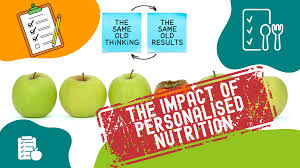Customized Nutrition: The Reasons Why One-Size-Fits-All Diets Are Ineffective

In the realm of health and wellness, the promise of a fast remedy has long been alluring. Numerous fads, ranging from miraculous pills to fad diets, claim that they are the best way to help everyone. However, anybody who has attempted to adhere to a widely accepted plan is aware of the fact that what suits one individual may not suit another. This fact is at the core of customized nutrition, an increasingly popular strategy that prioritizes the individual above the masses.
The Personalized Nutrition Science
It is now well known that a number of variables, such as metabolic rates, microbiome diversity, and inheritance, affect how we metabolize food. The same meal may have rather different effects on two people’s blood sugar levels, levels of satiety, and levels of energy.
These variations are taken into consideration in personalized nutrition. It makes use of information—sometimes from wearable technology, medical assessments, or genetic testing—to develop a dietary plan that complements a person’s biology. This method looks at more than simply weight reduction. It takes quality of life, illness prevention, and general health into account.
Food as medicine is a common theme among dietitians and nutritionists who specialize in this area. Instead of giving everyone the same diet, they help customers find nutritional patterns that fit their bodies and lifestyles. As a consequence, the approach seems more sustainable and organic.
Beyond Health
Nutrition affects more than just the physical body; it also influences lifestyle satisfaction and mental health. Stress and burnout are often the results of following a diet that disregards your cultural background, taste preferences, or daily routine. Personalized nutrition honors the human aspect of food; it places equal importance on balance, comfort, and pleasure as it does on nutritional value.
People are more inclined to follow through on a strategy when they feel heard and understood. Long-lasting effects may be achieved with small, customized adjustments. Personalized nutrition makes room for flexibility and pleasure, so there’s much more here than simply limitation.
The Practical Application Of Personalized Nutrition
A tailored strategy often starts with a thorough evaluation rather than the elimination of whole food categories or the imposition of strict limits. A dietician can inquire about health objectives, daily routines, preferred meals, and medical history. They then develop a plan that takes into account the person’s lifestyle while including the essential nutrients.
For instance, a person with high blood pressure could be advised to cut less on salt while still having familiar foods. Higher carbohydrate recommendations may be given to an athlete in order to enhance performance. Easy, well-balanced solutions that fit into a hectic schedule could be the emphasis of a busy parent.
In contrast to rigid diet plans, these suggestions seem doable and practical. Instead of imposing harsh limitations, they bring forth small, long-lasting changes.
Long-Term Achievement Via Customization
Sustainability is one of the main advantages of customized nutrition. Because they are overly strict, traditional diets often have short-term success but long-term failure. By tailoring the strategy to the individual rather than the other way around, personalized nutrition eliminates those pitfalls.
Consistency breeds results, and this flexibility breeds consistency. A customized strategy guarantees success without needless stress, regardless of the objective—whether it is to treat a chronic disease, lose weight, or just feel more energized.
People have better connections with food when they realize that nutrition is about knowing their body, not about following a fad. This change in perspective is effective. It boosts self-confidence in one’s capacity to make wise decisions and breaks cycles of yo-yo dieting.
Conclusion
Reality contradicts the alluring notion of a universal diet. Ignoring the fact that everybody reacts differently to food often results in failure. Individuality is valued in personalized nutrition, which uses science and compassion to develop long-term strategies that function in the real world.
Instead of chasing another trend, think about the advantages of figuring out what works for you. There is always more here than meets the eye when it comes to eating healthily, from genetics to lifestyle choices. You may go beyond short-term solutions and adopt a long-term, healthier, and more satisfying approach to eating by concentrating on individualized nutrition.



